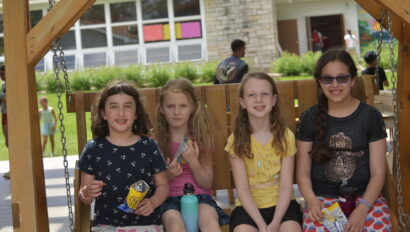Please enjoy a d’var Torah this week by educational consultant Natalie Blitt. Natalie joins us from Skokie, Illinois for her seventh summer on staff. She studied English at McGill and Journalism at The University of King’s College. She’s an education consultant for the iCenter, working to make Israel education an integral part of Jewish education. She is also the author of the young-adult novel The Distance from A to Z and the forthcoming The Truth About Leaving, as well as two middle-grade novels. Natalie and her husband, Rabbi Josh Feigelson, have three sons (in Machon, Solelim, and Rishonim).
The Power of Blessing: Reflections on Parashat Naso
by Natalie Blitt
In this week’s parashah, Naso, we have one of the most familiar sets of verses in the Torah. Sandwiched between talk of adultery, extremism, emissions, offerings and counting, God instructs Moses to tell Aaron and his sons to bless the Israelites by saying a very specific formula:
יְבָרֶכְךָ֥ יְהוָ֖ה וְיִשְׁמְרֶֽךָ׃ יָאֵ֨ר יְהוָ֧ה ׀ פָּנָ֛יו אֵלֶ֖יךָ וִֽיחֻנֶּֽךָּ׃ יִשָּׂ֨א יְהוָ֤ה ׀ פָּנָיו֙ אֵלֶ֔יךָ וְיָשֵׂ֥ם לְךָ֖ שָׁלֽוֹם׃
Y’varech’cha adonai v’yishm’recha. Ya’er adonai panav eilecha vichuneka. Yisa adonai panav eilecha v’yaseim l’cha shalom.
May God bless you and keep you.
May God cause the divine light to shine upon you and be gracious to you.
May God turn toward you, and grant you peace. (Numbers 6:24-26)
The Birkat Kohanim, or Priestly Blessing, is perhaps most famous for the catchy song created for the musical Fiddler on the Roof. But for many of us the intensity of the verses are compounded by the two moments we most frequently hear them: when the Kohanim (priests) bless the congregation and when parents bless their children.
While the Birkat Kohanim that we hear in synagogue is imbued with mystery and tradition – the kohanim hidden beneath their talitot, shoeless, their hands positioned in that completely unique way – when we as parents say the blessing it is in many ways the opposite. In our family, my husband and I separately bless each of our children, placing our hands on their heads as we recite these ancient words. It is a moment of intimacy and closeness, a moment to recite the familiar words and slip in a prayer or words of gratitude about each of them. The weeks when one of them is missing we feel the loss of the opportunity to bless them.
At camp, while we don’t have the opportunity to experience Birkat Kohanim as a ritual practice in tefillot (services), the campers do experience both the magic and the intimacy of the blessing. On Friday night, dressed in their Shabbat finery, campers gather by aidot (age cohorts) and then by tzrif (cabin). In these smaller gatherings, counselors lead their campers into a circle. Often, each camper will stretch out their arms (or turn to face the person beside them), put their hands on their friend’s head and recite the familiar words. It is a moment tinged with goofiness as befits a group of kids trying to get their hands on each other’s heads, but inside of that, there’s a moment of sweetness. Just as their parents bless them, they are blessing their friends.
I’m certain they don’t see the power of what they’re doing in that moment. But for those of us privileged to walk among them, we see them at this magical moment where they are focused on the action of blessing rather than simply receiving the blessing.
Shabbat shalom.






